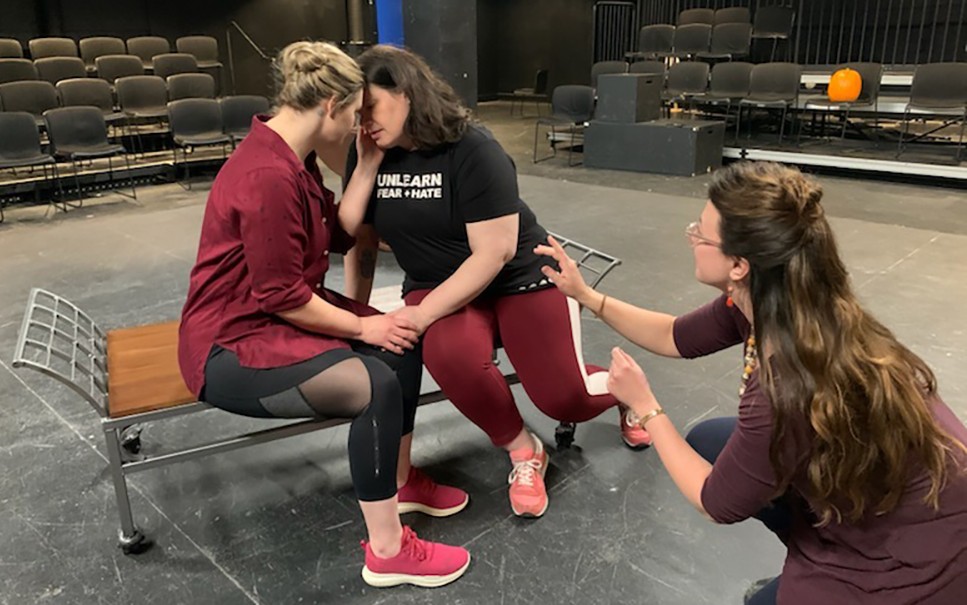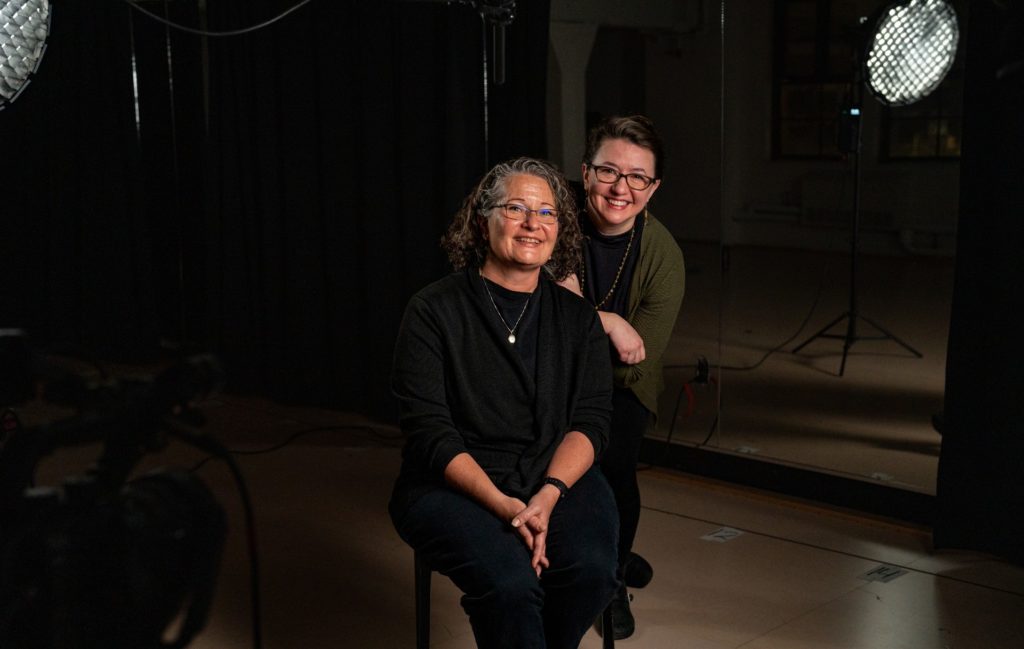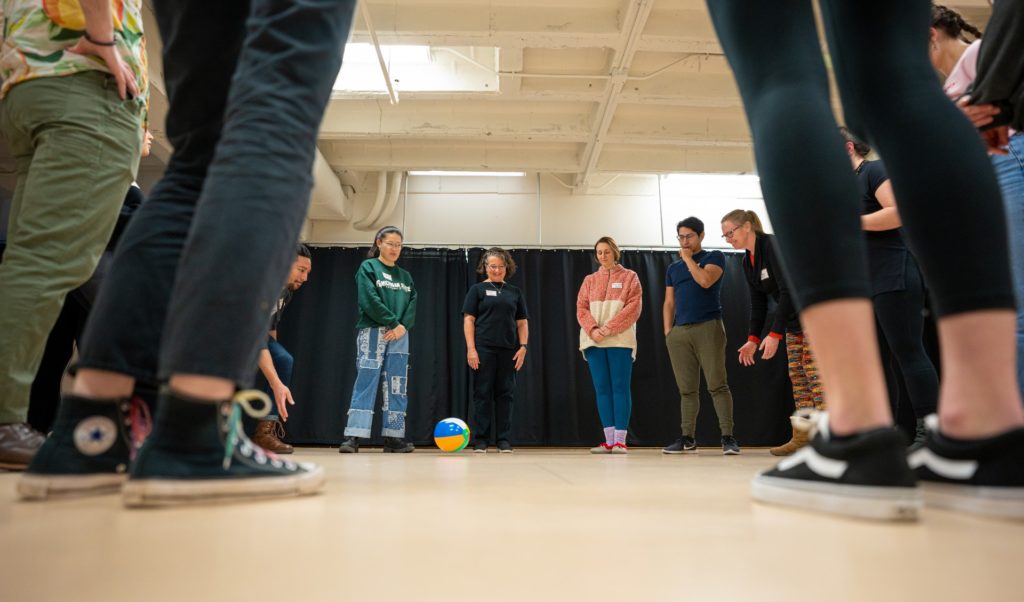MSU Theatre Professors Advocate for Safety, Boundaries, and Better Storytelling Through Intimacy Direction Education
When Alexis Black was a fight director for Broadway and off-Broadway shows, she noticed scenes involving intimacy were often an afterthought.
She felt like she had the skills to help actors with fight scenes but, at the time, was a bit unsure of what to do when scenes also included moments of intimacy.
The first time Black learned about intimacy direction was when Alicia Rodis, a friend she worked with in New York City, introduced her to the relatively new discipline. Rodis became the first intimacy coordinator employed by a major television network when HBO hired her in 2017.
“I thought, this is the most incredible thing I’ve ever heard of,” Black said. “Teaching actors about working with consent practices has been transformative to my work.”
Now an Assistant Professor of Acting Movement in the Michigan State University Department of Theatre, Black educates Theatre students and professionals about the importance of boundaries and consent in a performance as a certified intimacy director.
A recent addition to theatrical productions, the intimacy director choreographs moments of intense physical contact, ranging from an extended embrace to simulated sex acts, in a way that respects the boundaries of the individuals performing them.
“Intimacy direction is so important because it empowers actors to have agency, to have body autonomy in every part of the show.”
Alexis Black, Assistant Professor of Acting Movement
“Every other part of a production — the music, the set, the costumes, lighting, singing, dancing, fights — has so many hours that go into it, so much intention and so much collaboration. When I was acting in shows, we’d get to the moments of intimacy and there just wasn’t language,” she said. “The directors and the actors didn’t know how to approach it, because unlike this world that is imaginative, when people lock lips that’s real. Even though the circumstances are imaginative, that’s really happening.
“Directors didn’t have the skills or the language to know what to do with that necessarily, and so they’d say, ‘Just go in the other room and figure it out,’ or they’d ask for something to be done, and the actors didn’t feel like they had the power to say no. Intimacy direction is so important because it empowers actors to have agency, to have body autonomy in every part of the show.”
Stage Management and Intimacy Direction: A Natural Collaboration
Working closely with the intimacy director — and the entire company of a show, for that matter — is the stage manager, who ensures consistency in each performance once the director, choreographers, and designers leave after opening night.
“For stage managers, the most important thing is safety and maintaining the director’s story. That director’s story directly relates to what the dance choreographer, fight choreographer, and intimacy choreographer are bringing into the room,” said Tina M. Newhauser, head of the BFA Stage Management Program in MSU’s Department of Theatre. “The more we can know about what the intimacy director does and how to best support them — learn how they communicate, the language they use — the better we can support that entire process and everyone in the room, ensuring that the story being told to the audience on performance 1,000 is the same story that was told on opening night.”

(Photo by Ann Folino White, MSU Department of Theatre)
In the spring of 2019, Newhauser invited Black to speak to her advanced stage management class. They quickly saw how their work could intersect to bring a new approach to intimacy direction.
“At that point in time, no one had really been exploring intimacy direction from the view of a stage manager. Intimacy direction was so new that people were only looking at the role from the perspective of the actor,” said Newhauser, a professional stage manager with over 25 years of experience working in the industry prior to joining MSU. “I wanted to take a step back and look at intimacy direction more holistically and bring a collaborative approach to the practice. This meant exploring it not only through the lens of an intimacy director but also a director and stage manager. I wanted to learn more about how these individuals can work together to create a supportive space for actors and crew members.”
“I wanted to take a step back and look at intimacy direction more holistically and bring a collaborative approach to the practice. This meant exploring it not only through the lens of an intimacy director but also a director and stage manager.”
Tina M. Newhauser, Head of BFA Stage Management Program
In 2020, Black and Newhauser began teaching virtual workshops on intimacy direction for stage managers through the professional organization Intimacy Directors and Coordinators.
“We first taught that class in the summer of 2020 and it sold out. We’ve taught it nearly 10 times now and it has sold out every time,” Newhauser said. “The first couple of times we taught it, we realized it wasn’t just stage managers in the class. Stage managers made up about half. The other half were company managers, production managers, directors, dance choreographers, and others who said, ‘I want to know what this is and how it works with me.’”
Inspired in part by the feedback they received in these workshops, Black and Newhauser published a book titled “Supporting Staged Intimacy: A Practical Guide for Theatre Creatives, Managers and Crew” in late 2022. In February 2023, they held a signing at the Drama Book Shop, a famous hangout for theatre professionals in New York City.

“We are giving the actors a psychological, emotional, and physical tool to work with staged intimacy so they can find their own way to separate their character’s intimacy with another character from working with a colleague,” Black said. “The stage is a workplace, and actors need to work intentionally with colleagues when they’re engaging in these very physical and psychological stories.”
“This work helps to create that movement in a way where you’re using your actor tool kit,” Newhauser said. “You’re not using your personal emotional history. To me, that’s just a better way to work as a creative artist.”
“We are giving the actors a psychological, emotional, and physical tool to work with staged intimacy so they can find their own way to separate their character’s intimacy with another character from working with a colleague.”
Alexis Black, Assistant Professor of Acting Movement
Black has heard actors say that working with an intimacy director enhances their ability to tell a story on stage because it puts them in a healthier, more joyful mindset.
“They’re not nervous to walk into an intimate moment in the performance because they know it’s being done with consent, being done mindfully, and being done collaboratively,” she said. “We call it a play: It’s supposed to be fun and joyful to create theatre. Intimacy direction empowers actors to have agency so that joy and play can come into those moments of intense physical touch.”
Creating a Culture of Care
Black and Newhauser are also working to create these moments of joy for their students. Each semester, they lead an intimacy direction workshop for Spartans studying theatre. Students who are acting in that semester’s play are required to attend, but many others, including stage managers and crew members, attend on their own accord.
“It’s amazing how much desire there is for this work at Michigan State and how the students are hungry for it,” Black said.
Katherine Clemons, an MFA Acting student, came to MSU in part because she wanted to learn more about intimacy direction from Black. She said Black and Newhauser’s approach to intimacy direction inspires her as a performer and an educator.

“You can always create a brave space for students and allow them space in the classroom to feel like they can speak up for themselves and always have a voice in any room that they’re in. That’s important,” Clemons said.
At these workshops, students learn the basics of consent and setting boundaries in the theatre through presentations and interactive activities that Black and Newhauser facilitate.
“Through Alexis and Tina, I’ve learned about how to make the rehearsal room a safer environment for everybody, so everybody feels heard, seen, and knows consent practices, no matter how big or small the production.”
Hope Still, second-year Stage Management student
Oscar Quiroz, also an MFA Acting student, and Hope Still, a second-year Stage Management student, said they appreciate that the MSU Department of Theatre provides students with opportunities to learn about intimacy direction.
“Through Alexis and Tina, I’ve learned about how to make the rehearsal room a safer environment for everybody, so everybody feels heard, seen, and knows consent practices, no matter how big or small the production,” Still said.
“The Department of Theatre prioritizes safety and safe spaces for those we serve. The fact that we have specialists who are given the support to not only practice but also research and advance the discipline of intimacy direction, speaks to the commitment of the university,” Quiroz said.

Black said MSU Theatre students inspire her, just like she inspires them.
“Both as an educator and as an intimacy director, you’re hoping to form the artists of tomorrow. You’re hoping to form the humans of tomorrow who make the industry, or make the world, or make their space a better place,” Black said. “When teaching this work, the way that the actors’ eyes light up, the way that the stage managers are sharpening their pencils and ready to go, it creates such excitement and joy.”
Newhauser feels the same way.
“There’s always a lightbulb moment, and you see it in students all the time when their face just goes, ‘Oh, I get it!’ There’s that click,” she said. “When actors and directors and everyone come together and they’re being informed about intimacy direction and they have that click, that’s when they’re excited to learn more and have deeper discussions. And to me, that click is what you live for.”
Making Waves in the Theatre Industry
Newhauser is hopeful that intimacy directors will become a regular part of theatre productions, just like fight directors and dance choreographers.
“We didn’t always have fight directors, and they came into play, and eventually became the norm. I think having intimacy directors as part of a production will just be the norm, which is what we want,” Newhauser said. “Considered and cared for should be the norm.”
Black believes that starts with education.
“If intimacy direction is creating waves in the industry like a pebble falling in a bucket of water, I hope we don’t see the rock anymore, but the waves are still there.”
Alexis Black, Assistant Professor of Acting Movement
“The most rewarding part is knowing that by doing what we’re doing, whether it’s being one of the resources or writing one of the books out there about intimacy direction, we’re playing a part in creating better theatrical spaces to work in,” she said. “I hope that when the actors who are now first-year students graduate, intimacy direction is part of every space they go into.”
“If intimacy direction is creating waves in the industry like a pebble falling in a bucket of water, I hope we don’t see the rock anymore, but the waves are still there. The waves are everything we’re doing in this space to make it more consensual, healthier, more joyful, and collaborative — and intimacy direction is one part of that.”
(Written by Alex Tekip – Original story published by MSU Today March 20, 2023)


